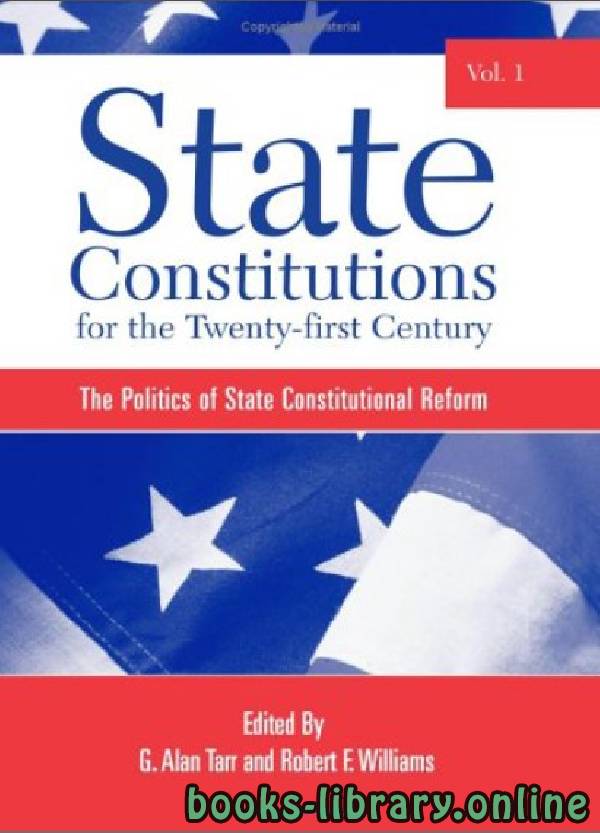📘 ❞ State Constitutions for the Twenty-first Century Vol. 1 text 10 ❝ كتاب ــ ألان تار وروبرت ف. ويليامز اصدار 2006
English إنجليزي - 📖 كتاب ❞ State Constitutions for the Twenty-first Century Vol. 1 text 10 ❝ ــ ألان تار وروبرت ف. ويليامز 📖
█ _ ألان تار وروبرت ف ويليامز 2006 حصريا كتاب ❞ State Constitutions for the Twenty first Century Vol 1 text 10 ❝ عن جميع الحقوق محفوظة للمؤلف 2025 10: Book Description State 1 If one compares American state constitutions with their federal counterpart, one is immediately struck by how differently documents deal with constitutional change Although framers of Constitution wanted to make easier than it had been under Articles Confederation, they remained wary an excessive “mutability laws,” and worried that too frequent constitutional change would undermine popular attachment fundamental law The Federal Constitution makes no express provision its own replacement—any convention proposing a new national constitution would, like Philadelphia Convention 1787, be operating on the fringes legality It provides two mechanisms amendments (proposal Congress or convention), but requires supermajorities in both instances: thirds majority each house of Congress propose amendment petitions from the states call Finally, requires extraordinary, geographically dispersed (three quarters states) to ratify proposed amendments 2 شرح الكتاب : إذا قارن المرء دساتير الولايات الأمريكية مع نظيرتها الفيدرالية يصاب الفور بمدى الاختلاف التعامل المستندات مع التغيير الدستوري الرغم من واضعي الدستور الاتحادي أراد أن يجعل أسهل مما كان عليه بموجب مواد الاتحاد ظلوا حذرين المبالغة "تعديل القوانين" وكانوا قلقين كثرة الدستورية التغيير شأنه يقوض الارتباط الشعبي بالأساسي لا ينص الاتحادي نص صريح خاص به الاستبدال أي اتفاقية تقترح دستورًا وطنيًا جديدًا مثل فيلادلفيا لعام 1787 تعمل على هوامش الشرعية يوفر آليتين لاقتراح التعديلات (مقترح الكونجرس أو خلال دستورية) لكنه يتطلب الأغلبية العظمى كلتا الحالتين: أغلبية الثلثين كل منزل الكونجرس تعديل التماسات ثلثي الدول للدعوة إلى أخيرًا يتطلب أمرًا استثنائيًا أغلبية متفرقة جغرافيا (ثلاثة أرباع الولايات) المصادقة التعديلات المقترحة G Alan Tarr Robert F Williams English إنجليزي مجاناً PDF اونلاين ركن بكتب مجانيه للتحميل

كتاب
State Constitutions for the Twenty-first Century Vol. 1 text 10
ــ ألان تار وروبرت ف. ويليامز
صدر 2006م
كتاب
State Constitutions for the Twenty-first Century Vol. 1 text 10
ــ ألان تار وروبرت ف. ويليامز
صدر 2006م- مساهمة من: احمد الراوي
( السبت 29 فبراير 2020 ( 4:35 مساءً )) - تبليغ عن سوء استخدام


Book Description
State Constitutions for the Twenty-first Century Vol. 1
If one compares American state constitutions with their federal counterpart,
one is immediately struck by how differently the documents deal
with constitutional change. Although the framers of the federal Constitution
wanted to make constitutional change easier than it had been
under the Articles of Confederation, they remained wary of an excessive
“mutability of the laws,” and they worried that too frequent constitutional
change would undermine popular attachment to the fundamental
law.1 The Federal Constitution makes no express provision for its own
replacement—any convention proposing a new national constitution
would, like the Philadelphia Convention of 1787, be operating on the
fringes of legality. It provides two mechanisms for proposing amendments
(proposal by Congress or by constitutional convention), but it requires
supermajorities in both instances: a two-thirds majority in each house of
Congress to propose an amendment or petitions from two-thirds of the
states to call for a convention. Finally, the Constitution requires an extraordinary,
geographically dispersed majority (three-quarters of the states)
to ratify proposed amendments.2
شرح الكتاب :
إذا قارن المرء دساتير الولايات الأمريكية مع نظيرتها الفيدرالية ،
يصاب المرء على الفور بمدى الاختلاف في التعامل مع المستندات
مع التغيير الدستوري. على الرغم من واضعي الدستور الاتحادي
أراد أن يجعل التغيير الدستوري أسهل مما كان عليه
بموجب مواد الاتحاد ، ظلوا حذرين من المبالغة
"تعديل القوانين" ، وكانوا قلقين من أن كثرة الدستورية
التغيير من شأنه أن يقوض الارتباط الشعبي بالأساسي
لا ينص الدستور الاتحادي على نص صريح خاص به
الاستبدال - أي اتفاقية تقترح دستورًا وطنيًا جديدًا
، مثل اتفاقية فيلادلفيا لعام 1787 ، تعمل على
هوامش الشرعية. يوفر آليتين لاقتراح التعديلات
(مقترح من الكونجرس أو من خلال اتفاقية دستورية) ، لكنه يتطلب
الأغلبية العظمى في كلتا الحالتين: أغلبية الثلثين في كل منزل
الكونجرس لاقتراح تعديل أو التماسات من ثلثي
الدول للدعوة إلى اتفاقية. أخيرًا ، يتطلب الدستور أمرًا استثنائيًا ،
أغلبية متفرقة جغرافيا (ثلاثة أرباع الولايات)
المصادقة على التعديلات المقترحة
G. Alan Tarr and Robert F. Williams
#2K
0 مشاهدة هذا اليوم#110K
3 مشاهدة هذا الشهر#88K
2K إجمالي المشاهدات- 🎁 كن أول كاتب اقتباس في هذه الصفحة واحصل على هديّة 15 من النقاط فوراً 🎁
